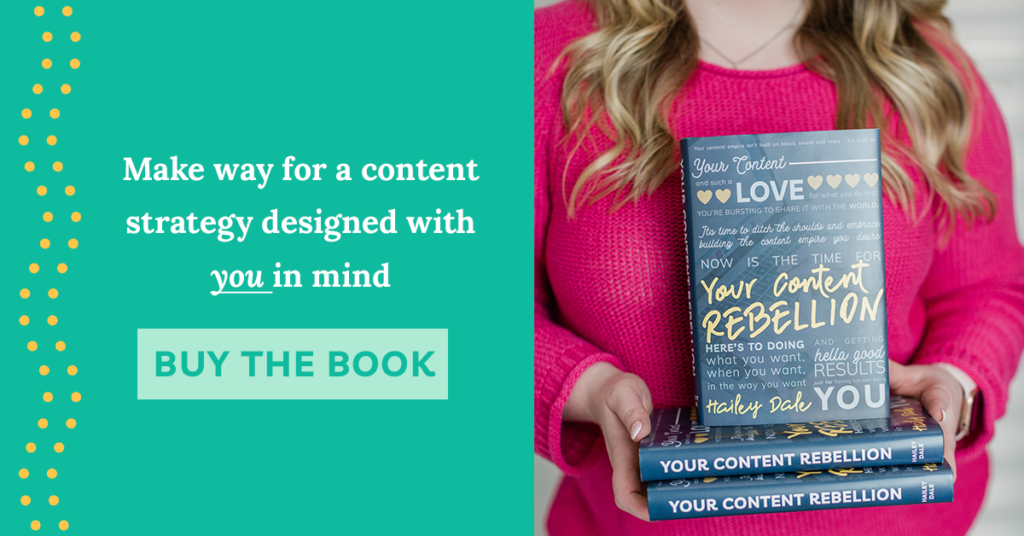Why trying to be consistent isn’t really the problem with your content
We have been led to believe that being consistent with content and our marketing is the only way we’re going to get results. And I’ve been guilty of this myself because it makes sense–unless you’re consistent with content and showing up enough to stay top-of-mind with your potential customers, there’s no way they’re just going to think of you first.
You need a way of connecting, staying in touch, and deepening relationships with them before they’re ready to sign up with you, work with you, or buy from you. But where we get into trouble is believing that consistency is not just where it all starts, but the end-all-be-all. We think that if we can white-knuckle our way to consistently getting our content out there, that results will automatically follow.
Most of us got into our business because we desired the freedom to work on what we wanted. Although we probably started our new venture with some kind of passion to help people or dive deeper into a specific area of expertise, somewhere along the way we forgot why we started. This trickled over into the content side of our business as well.
A lot of the people I talk with actually don’t like creating content (or they think that they don’t like creating content) because of the way they’re forcing themselves to create it. It just doesn’t feel like them—whether it’s the topics they’re writing about, the medium they’re using, or the platforms they’re showing up on. It’s funny that we started our business for freedom, and we ended up in a situation where we’re forced to do things we really don’t like.
Why it’s actually all about fun and enjoyment
While I’ll admit that being consistent with content is definitely important, I think we’re actually going to be a lot more effective at achieving it if we start with fun and enjoyment. Now, before you roll your eyes, bear with me a second.
I believe that if we focus on finding a process for creating content that we enjoy, we’re much more likely to do it and achieve consistency of content. And because of that enjoyment and being consistent with content, we’re also more likely to stick with the process long enough to start seeing real results.
Results then funnel back into enjoying the process because we know that our content is resonating with the very people we want to be working with—it's helping them. If we have more fun creating our content, then I truly believe that the quality of that content is going to be a lot higher as well.
Instead of choosing topics that bore us to tears (or that just check some sort of box of what we think we should be writing about), we could be choosing topics that we’re truly curious about. If we really want to learn more about a specific topic, we won’t mind spending time exploring it through the content creation process.
Instead of forcing ourselves to write content that is so chock full of keywords it sounds like a robot, we could focus on finding a style of content creation that lights us up. Maybe that’s creating videos or having conversations on a podcast with people we are really interested in learning more about.
When we force ourselves to be social, it can make us feel like we’re adopting other personas on social media channels that we wouldn’t be caught dead on if it wasn’t for our business. Picking platforms (or ways of using those platforms) that align with who we are allows us to connect to others in ways that work for us.
So, there are really two ways that you can go about your content. You can focus primarily on the “consistent with content” angle and white-knuckle your way there, dreading the entire journey from start to finish. Or, you can focus on finding a process that’s full of fun and enjoyment, and play your way to consistency and the results that you want to see.
Why I’m calling this a content rebellion
I’m calling this a content rebellion because I think for too long it’s been an either-or situation. Either I’m going to have fun in my business, make no money and not see any results, or, I’m going to suck all of the joy out of my business by being super serious about getting results, even though I’m not enjoying myself at all.
Embracing the content rebellion breaks that rigid paradigm because when you focus on having more fun and enjoying your business, I think you’re going to make even more money.
Another reason I’m calling this a content rebellion is because I think that we need to be done with adopting what other experts tell us we should be doing without questioning whether it’s actually right for us. We surf around the internet and are bombarded with all of the shoulds—the people telling us that we should be doing this, and if we don’t do this well, we can kiss our businesses goodbye. We start to believe that “this is the only way” because “it’s a proven method”, and we go a little bit crazy trying to keep up with it all.
I think a content rebellion is about finding your joy in the process as much as it is about finding your own way of doing things. Only through rebellion and finding your joy are you going to achieve the consistency you want to consistently start seeing… those results that maybe have been eluding you for a long time.
Here are 3 tips to get you started with your content rebellion
#1 – Review how you’ve been doing content in the past.
A big part of the rebellion starts with reviewing and unpacking the way you’ve been forcing yourself to do content until now. Are there parts of the process that you really enjoy? Do you hate the whole thing from start to finish?
We start by reviewing because we want to know how much of your process you can salvage in your version of a content rebellion. I want you to look at a variety of things, such as the topics you’ve been writing about and the mediums you’ve been using (whether they’ve been written, video or audio). I also want you to look at the platforms that you’ve been publishing your content on, including the ones you’ve been using for social media and promotion.
Are those working for you? Or, has the way you’ve been using them stripping your enjoyment of them? Make a list of what works and what hasn’t been working. Get specific.
#2 – Make a list of experiments.
I want you to make a list of what you’re curious about trying with your content and marketing. List out some potential experiments. This might include testing out YouTube, dabbling in a podcast, or dropping Instagram to focus more on Pinterest. Whatever these different experiments are for you, I want you to list out your ideas. Read my blog post about experimentation here.
You might even look at what other people are doing in different industries. But, if you do this, be sure to remember that just because they're doing it, doesn't mean that you should be doing it. Do it because it piques your curiosity and because you think it might be interesting to try. As you’re building this list of experiments, we really want to make sure that you are coming at it from an angle of curiosity and experimentation.
#3 – Find your curiosity.
Like I mentioned before, curiosity is a huge part of your content rebellion. You’ve likely been adopting what other people say you should be doing for so long that it’s caused you to lose your way and ultimately to disconnect from what you want to be doing. That’s why we want to find your curiosity and make sure that we are coming up with what will help you experience more fun and enjoyment with your content.
A big part of discovering your curiosity is looking at the topics that you’re writing about. Instead of writing about topics that you think people want to be hearing (and you think you should be writing about), what I want you to do instead is to come up with a list of questions or ideas around your area of expertise. What do you want to learn more about? If you think you’re already an expert in your field, remember that there are always things that you could be learning and diving deeper into. Make a list of those things that you’re curious about.
A big reason we develop content is that it allows us to sharpen our expertise. It helps us keep current with our industry and articulate the things that we do on a day-to-day basis—the very things that we may have started to take for granted. In sum, content creation is not only a means to an end (achieving specific business results), it can be an important part of our expertise development.







